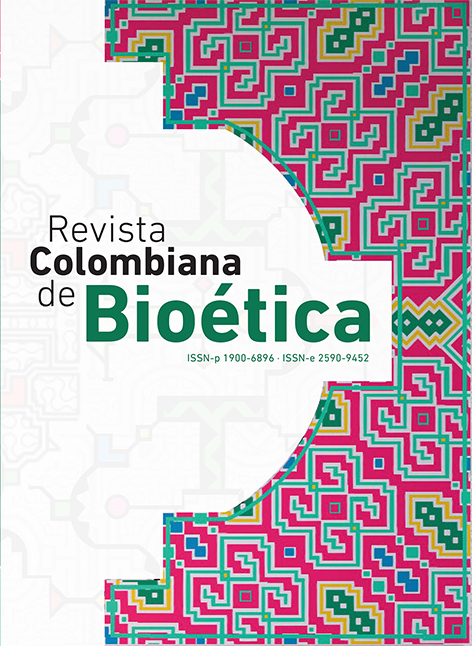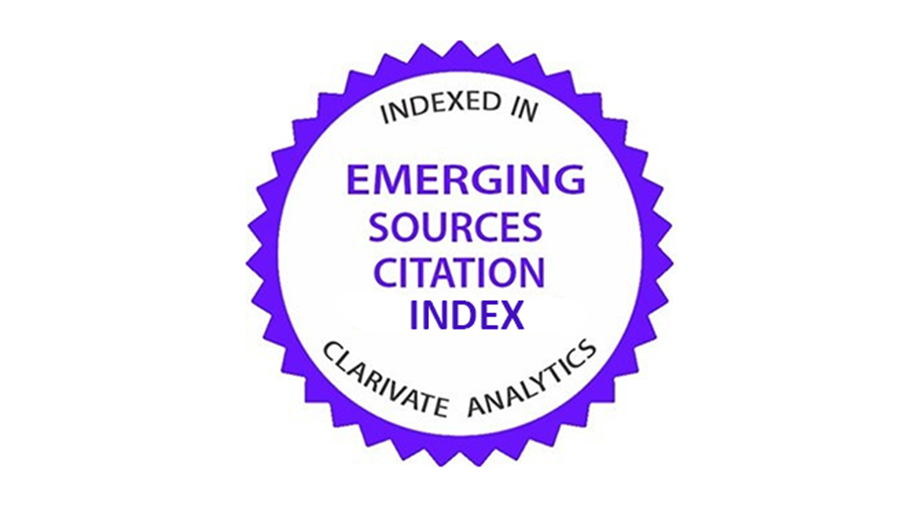Ethical considerations for research with children and adolescents as co-investigators, a reflection from the Chilean experience
DOI:
https://doi.org/10.18270/rcb.v18i2.4372Keywords:
Children, Co-Researchers, Research Ethics, Participatory Methodologies, ChildhoodAbstract
Purpose/Context: This article responds to a preliminary conceptual review focused on the analysis of the ethical considerations of research involving children and adolescents as participants in scientific research as co-researchers.
Methodology/Approach: This article orients its reflection through the review of national Chilean and international regulations and relevant literature on child and adolescent participation in research, establishing specific criteria to be considered as ethical safeguards.
Results/Findings: Promoting community participation in research has become a strategy to ensure that the knowledge generated is relevant and facilitates effective changes; in addition, involving children and adolescents as co-researchers contributes to add social and scientific value to studies that address issues that affect them directly.
Discussion/Conclusions/Contributions: This article contributes to the understanding of the ethical and methodological dimensions associated with designs in which children and teenagers are involved as co-researchers, highlighting the particularity of the stage of development they are in, the protection of their dignity and the promotion of instances of participation in research, inviting the reflection of adults who are part of research teams so that they evaluate the relevance and ethical safeguards when involving these participants.
Downloads
References
Aguirre Muñoz, Paulina, Ayline Allendes Guerrero, Natalia González Ortega y Alexandra Jeldes Pizarro. 2021. “Percepciones de Niños, Niñas y Adolescentes co-investigadores/as respecto a la participación y otros derechos.” Tesis de licenciatura, Universidad de Valparaíso.
Asamblea General de las Naciones Unidas. 1989. “Convención de los Derechos del niño y de la niña.” Acceso en enero 3, 2022. https://www.unicef.org/es/convencion-derechos-nino/texto-convencion
Asociación Médica Mundial. 1964. “Declaración de Helsinki de la AMM - Principios éticos para las investigaciones médicas en seres humanos.” https://www.wma.net/es/policies-post/declaracion-de-helsinki-de-la-amm-principios-eticos-para-las-investigaciones-medicas-en-seres-humanos/
Baker, Robert. 2001. “Bioethics and Human Rights: A Historical Perspective.” Cambridge Quarterly of Healthcare Ethics 10, no. 3: 241-52. https://doi.org/10.1017/S0963180101003048
Bambs, C., Pascual, M. y Guerrero, P. 2022. “Seminario Sentirnos bien: niños y niñas como investigadores para potenciar la salud y el bienestar en la escuela.” Santiago, Chile.
Beauchamp, Tom L. y Yashar Saghai. 2012. “The historical foundations of the research-practice distinction in bioethics.” Theoretical Medicine & Bioethics 33: 45-56. https://doi.org/10.1007/s11017-011-9207-8
Bergold, Jarg y Stefan Thomas. 2012. “Participatory research methods: A methodological approach in motion.” Forum: Qualitative Social Research 13, no. 1. http://dx.doi.org/10.2307/41756482
Brady, Louca-Mai y Berni Graham. 2019. Social Research with Children and Young People A Practical Guide. Reino Unido: Bristol University Press. https://doi.org/10.56687/9781447352792
Cahill, Helen y Babak Dadvand. 2018. “Re-conceptualising youth participation: A framework to inform action.” Children and Youth Services Review 95: 243-53. https://doi.org/10.1016/j.childyouth.2018.11.001
Campos, Shirley. 2009. “La Convención sobre los Derechos del Niño: el cambio de paradigma y el acceso a la justicia.” Revista IIDH 50: 351-77.
Christensen, Pia y Alan Prout. 2002. “Working with ethical symmetry in social research with children.” Childhood 9, no. 4: 477-97. https://doi.org/10.1177/0907568202009004007
Cioms. 2016. Pautas éticas internacionales para la investigación relacionada con la salud con seres humanos. Washington: Paho. https://cioms.ch/wp-content/uploads/2017/12/CIOMS-EthicalGuideline_SP_INTERIOR-FINAL.pdf
Clark, Alison y June Statham. 2005. “Listening to young children: experts in their own lives.” Adoption & Fostering 29: 4556. https://doi.org/10.1177/030857590502900106
Climate Change and Public Health Law. 2022. “Final report of the Tuskegee Syphilis Study Ad Hoc Advisory Panel.” Historic Public Health Reports. https://biotech.law.lsu.edu/cphl/history/reports/tuskegee/tuskegee.htm
Congreso Nacional de Chile. 1999. “Ley 19.628.” Diario Oficial de la República de Chile.
Congreso Nacional de Chile. 2006. “Ley 20.120.” Diario Oficial de la República de Chile.
Congreso Nacional de Chile. 2009. “Ley 20.380.” Diario Oficial de la República de Chile.
Compromiso Escolar. 2022. “Compromiso escolar.” https://compromisoescolar.com
Coyne, Imelda y Bernie Carter. 2018. Being participatory: researching with children and young people. Co-constructing knowledge using creative techniques. Nueva York: Springer International Publishing. https://doi.org/10.1007/978-3-319-71228-4
Daly, Wayne. 2009. “‘Adding Their Flavour to the Mix’: Involving Children and Young People in Care in Research Design.” Australian Social Work 62, no. 4: 460-75. https://doi.org/10.1080/03124070903265732
Emanuel, Ezekiel. 1999. “¿Qué hace que la investigación clínica sea ética? Siete requisitos éticos.” En Investigación en sujetos humanos: experiencia internacional, editado por Alberto Pellegrini Filho y Ruth Macklin, 33-46. Santiago de Chile: Programa Regional de Bioética OPS/ OMS.
Explora. 2022. “Explora.” https://www.explora.cl/rmnorte/clubes-cientificos-escolares-curiosidad-y-creatividad/
Gaitán, Lourdes. 2006. “La nueva sociología de la infancia. Aportaciones de una mirada distinta.” Política y Sociedad 43, no. 1: 9-26.
Gibbs, Lisa, Mariah Kornbluh, Katitza Marinkovic, Sherry Bell y Emily J. Ozer. 2020. “Using Technology to Scale up Youth-Led Participatory Action Research: A Systematic Review.” Journal of Adolescent Health 67, no. 2: S14-23. https://doi.org/10.1016/j.jadohealth.2019.10.019
Graham, Anne, Mary Ann Powell, Nicola Taylor, Donnah Anderson y Robyn Fitzgerald. 2013. Investigación ética con niños. Florencia: Centro de Investigaciones de Unicef.
Heatley, Ana. 2022. “Vulnerabilidad a la pobreza y la juventud. Entre la desprotección y el adultocentrismo.” Gestión y Política Pública XXXI, no. 1: 127-58. https://doi.org/10.29265/gypp.v31i1.1015
Kellett, Mary. 2010. “Small shoes, big steps! Empowering children as active researchers.” American Journal of Community Psychology 46, no. 1: 195-203. https://doi.org/10.1007/s10464-010-9324-y
Lansdown, Gerison. 2005. La evolución de las facultades del niño. Siena, Italia: Fondo de las Naciones Unidas para la Infancia - UNICEF. https://www.unicef-irc.org/publications/pdf/EVOLVING-E.pdf
Larsson, Ingrid, Carin Staland-Nyman, Petra Svedberg, Jens Nygren e Ing-Marie Carlsson. 2018. “Children and young people’s participation in developing interventions in health and well-being: a scoping review.” BMC Health Services Research 18: 507. https://doi.org/10.1186/s12913-018-3219-2
Lenta, María Malena y Graciela Zaldúa. 2020. “Vulnerabilidad y exigibilidad de derechos: la perspectiva de niños, niñas y adolescentes.” Psykhe 29, no. 1: 1-13. https://doi.org/10.7764/psykhe.29.1.1225
Liebel, Manfred. 2022. “Contrarrestar el adultocentrismo. Sobre niñez, participación política y justicia intergeneracional.” Última década 58: 4-36. https://doi.org/10.4067/S0718-22362022000100004
Liebel, Manfred y Urszyla Markowska-Manista. 2021. “Presentación. Cuestiones éticas y epistemológicas en la investigación con niños.” Editorial Sociedad e Infancias 5: 1-4. https://dx.doi.org/10.5209/soci.74230
Lundy, Laura y Lesley McEvoy. 2011. “Children’s rights and research processes: Assisting children to (in)formed views.” Childhood 19, no. 1: 129-44. https://doi.org/10.1177%2F0907568211409078
Lundy, Laura. 2007. “‘Voice’ is not enough: conceptualising Article 12 of the United Nations Convention on the Rights of the Child.” British Educational Research Journal 33, no. 6: 927-42. https://doi.org/10.1080/01411920701657033
Manzi, Alberto. 2013. “La doctrina de la situación irregular y la protección integral. Algunos ejes comparativos.” Revista del Instituto de Estudios Penales 9: 345-70.
Ministerio de Ciencia, Tecnología, Conocimiento e Innovación. 2022. “Ministerio de ciencia, tecnología, conocimiento e innovación.” https://www.minciencia.gob.cl/
Montenegro, Cristian, Paulina Bravo, Angelina Dois y Cecilia Rodríguez. 2021. “Experiencia usuaria en salud: hacia un modelo de atención que escucha a los usuarios.” Temas de la Agenda Pública 16, no. 134: 1-14.
Organización Mundial de la Salud. 1948. “Official Records of the World Health Organization, Nº 2.” https://apps.who.int/iris/bitstream/handle/10665/85573/Official_record2_eng.pdf
Organización Mundial de la Salud. 1986. “Ottawa charter for health promotion.” http://www.who.int/healthpromotion/conferences/previous/ottawa/en/
Ospina Serna, Héctor Fabio y Sara Victoria Alvarado. 2014. Socialización política y configuración de subjetividades: Construcción social de niños, niñas y jóvenes como sujetos. Colombia: Siglo del Hombre Editores, Universidad de Manizales y Cinde.
Ospina-Ramírez, David Arturo y María Camila Ospina-Alvarado. 2017. “Futuros posibles, el potencial creativo de niñas y niños para la construcción de paz.” Revista Latinoamericana de Ciencias Sociales, Niñez y Juventud 15, no. 1: 175-92.
Phelan, Shanon K. y Elizabeth Anne Kinsella. 2013. “Picture This…Safety, Dignity and Voice - Ethical Research with Children: Practical Considerations for the Reflexive Researcher.” Qualitative Inquiry 19, no. 2: 81-90. https://doi.org/10.1177/1077800412462987
Roger, Camille. 2013. El enfoque de Protección Integral de los Derechos de la Primera Infancia en América Latina. Sistema de Información sobre la Primera Infancia en América Latina (SIPI), Fundación Arcor y Unicef. https://juegosdeportivosestudiantiles.com/wp-content/uploads/2020/02/El-enfoque-de-Protecci%C3%B3n-Integral-de-los-Derechos-de-la-Primera-Infancia-en-Am%C3%A9rica-Latina.pdf
Santana, Alejandra y Luca Valera. 2022. Ética y seguridad en la investigación. Colombia: Ediciones Universidad Católica.
Saracostti, Mahia. 2021. “Proyecto Fondecyt Regular. Modelización del compromiso escolar, factores contextuales (familiares y escolares) y logros socioeducativos en niños, niñas y adolescentes (NNA): desde la literatura científica internacional a un estudio longitudinal mixto en el contexto chileno.”
Saracostti, Mahia, Pamela Caro, María O. Grau, Ana Patricia Kinkead y Nicolás Vatter. 2015. “El derecho de participación en la niñez: alcances y desafíos para la investigación social.” Revista del CLAD Reforma y Democracia 62: 211-44.
Saracostti, Mahia, Ximena de Toro y Alicia Veas. 2022a. “Recursos para niños, niñas y adolescentes coinvestigadores del compromiso escolar.” Proyecto ANID/FONDECYT 1210172 y ANID/FONDEF IT 19I0172. https://compromisoescolar.com/pdf/11
Saracostti, Mahia, Ximena de Toro y Alicia Veas. 2022b. Pequeños grandes investigadores. Herramientas para que niños, niñas y adolescentes aprendan a investigar sobre compromiso escolar y otros temas. Ediciones Universidad Autónoma.
Shier, Harry. 2011. “Niñas, niños y adolescentes como investigadores/as en Nicaragua: De Consultoría Infantil a Investigación Transformadora.” Ponencia presentada al segundo simposio internacional ‘Encuentros etnográficos con niños, niñas y jóvenes en contextos educativos’, Cesesma.
Shier, Harry. 2018. “Towards a New Improved Pedagogy of Children’s Rights and Responsibilities.” International Journal of Children’s Rights 26, no. 4: 761-80. https://doi.org/10.1163/15718182-02604003
Spriggs, Merle y Lynn Gillam. 2019. “Ethical complexities in child co-research.” Research Ethics 15, no. 1: 1-16. https://doi.org/10.1177/1747016117750207
Stokes, Tríona. 2020. “Using participatory methods with young children; reflections on emergent‘ethically important moments’in school-based research.” Irish Educational Studies 39, no. 3: 375-87, https://doi.org/10.1080/03323315.2019.1697944
The National Commission for the Protection of Biomedical and Behavioral Research. 1979. The Belmont Report. Ethical principles and Guidelines for the Pretection of Human Subjects Research. Estados Unidos: The National Commission for the Protection of Biomedical and Behavioral Research.
Unesco. 2005. Declaración Universal sobre Bioética y Derechos Humanos. https://unesdoc.unesco.org/ark:/48223/pf0000146180_spa
Unicef. 2015. Los derechos de los niños, una orientación y un límite. Definiciones conceptuales para un sistema integral de protección a la infancia. Unicef.
Unicef. 2022. Unicef. https://www.unicef.org/es
U. S. Department of Health and Human Services. 1981. “Common Rule. 45CFR46, Subpart A of the HHS regulations for the protection of human subjects in research.” https://www.hhs.gov/ohrp/regulations-and-policy/regulations/45-cfr-46/revised-common-rule-regulatory-text/index.html
Vaughn, Lisa M. y Farrah Jacquez. 2020. “Participatory Research Methods - Choice Points in the Research Process.” Journal of Participatory Research Methods 1, no. 1: 1-13. https://doi.org/10.35844/001c.13244
Willumsen, Elisabeth, Jon Vegar Hugaas e Ingunn Studsrød. 2014. “The child as co-researcher—moral and epistemological issues in childhood research.” Ethics and Social Welfare 8: 332-49. https://doi.org/10.1080/17496535.2014.894108
Downloads
Published
How to Cite
Issue
Section
License
Copyright (c) 2023 Revista Colombiana de Bioética

This work is licensed under a Creative Commons Attribution-NonCommercial-NoDerivatives 4.0 International License.

Esta obra está bajo licencia internacional Creative Commons Reconocimiento-NoComercial-SinObrasDerivadas 4.0.















